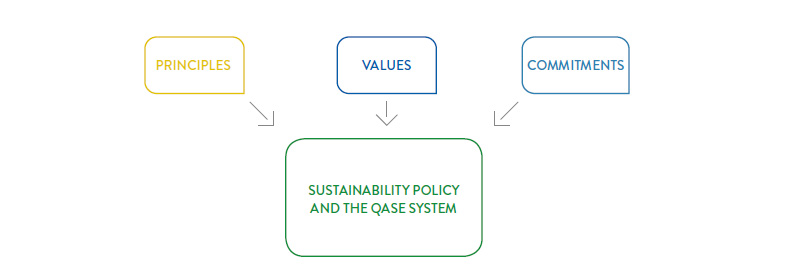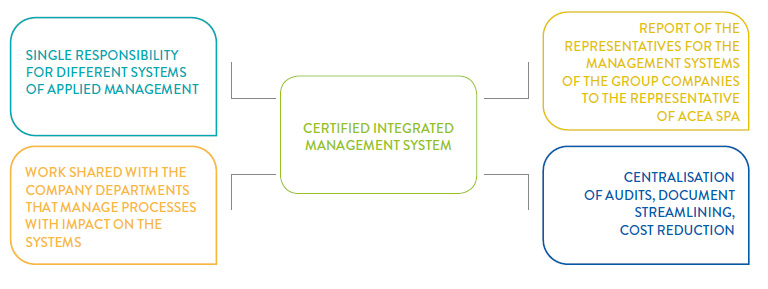Governance and sustainability
In Acea, sustainability is increasingly integrated into Corporate Governance, with the aim of generating value for all stakeholders.
The following are the main bodies and tools that promote the integration of sustainability in the business:
- The Ethics and Sustainability Committee provides the Board of Directors with advisory and proactive support in the areas of corporate ethics and environmental, social and governance issues.
The Committee was also recently assigned responsibility for the promotion of a culture of diversity and fighting discrimination in the company. In 2018 it met eight times. - the Sustainability Advisory Board is a panel responsible for providing support to the Acea Chairman and CEO, began its activities in order to supervise the implementation of the Sustainability Plan – with regard to both governance level guidelines and operational level objectives – and its periodic review.
The composition of the Board is established by the Board of Directors. It consists of the main Functions and Departments of the Holding Company, which also have responsibility for the governance level of sustainability. To date, the Functions/Departments involved are: External Relations and Communications; Internal Audit; Risk & Compliance; Administration, Finance and Control; Investor Relations; Human Capital Development; Innovation, Technology & Solution; Corporate Affairs and Services Department; Board of Directors’ Secretariat.
In 2018, the Board met three times, focusing in particular on the governance level and the first results of the progress of sustainability objectives at the operational level thanks to the implementation of a periodic monitoring process, sharing reflections on initiatives to promote the implementation of the Sustainability Plan.
In compliance with the tasks set out in its regulations, the Board also promoted and coordinated a calendar of seminars carried out by a qualified external organisation, examining topics of specific interest consistent with the strategic plan outlined in the Sustainability Plan, useful for further developing the integration of sustainability into the company’s management logic.
These seminars were attended by colleagues representing the Group Organisational Units/Companies pertinent to the subject under discussion. The topics were: Climate Change; Sustainability in business risk management; Performance management system and sustainability objectives.
Being a panel, the Board has also made a positive contribution to the sharing of knowledge and information among the various Functions, encouraging synergies and cross-cutting collaborations on sustainability projects and initiatives and the development of new corporate actions implemented to incorporate the targets of the Sustainability Plan. - Policy for sustainability and the quality, environment, safety and energy system breaks down the principles, values and commitments undertaken by the company, placing them in the framework of the pursuit of sustainable development and it is an integral part of the Management Systems conform to standards ISO 9001, ISO 14001, OHSAS18001 e ISO 50001.
Sustainable policy and the QASE system

The management of quality, the environment, safety and energy are central aspects in corporate operations, as confirmed by the number of Group companies which have implemented certified integrated management systems over time.
Considering the companies as a whole, about 75% hold a quality certification, 75% an environmental certification (100% in the Water and Environment business areas) more than 90% have safety certification (100% in the Water, Environment and Infrastructure industrial segments) and more than 40% an energy certificate management system.
The Certified Integrated Management System

Integrated Risk Analysis
In order to promote an integrated view of the risk profile and the proactive management of the risks themselves, associated with the many business processes, Acea has launched the ERM Programme, based on the recent COSO framework “Enterprise Risk Management (ERM) - Integrating with Strategy and Performance”, aimed at representing the nature and level – in qualitative terms – of the main risks that may jeopardise the achievement of industrial planning and sustainability objectives, as well as directing the development strategies of a mitigation plan, where necessary.
According to the ERM programme, risk management in the Acea Group is a structured and continuous process, carried out in order to treat the risks of the entire organisation in an integrated manner, in line with the propensity to risk expressed, in order to guarantee management the information necessary to take the most appropriate decisions for the achievement of strategic and business objectives, for the safeguarding, growth and creation of company value (see also the dedicated box).
The methodology implemented and the support tools developed to allow a consistent representation at a Group level when identifying and assessing the severity of risks have taken into account the main sustainability issues both in the classification of sources of risk (“suffered” risks) and in the type of object potentially affected by the risk, understood as economic/financial, technical/production, natural, intellectual, human and social/relational capital (“generated” risks).
The results of the ERM Programme are also taken into account when planning actions to address risks and seize opportunities for Acea Group companies that implement management systems that comply with the new ISO 9001:2015 and ISO 14001:2015 standards.